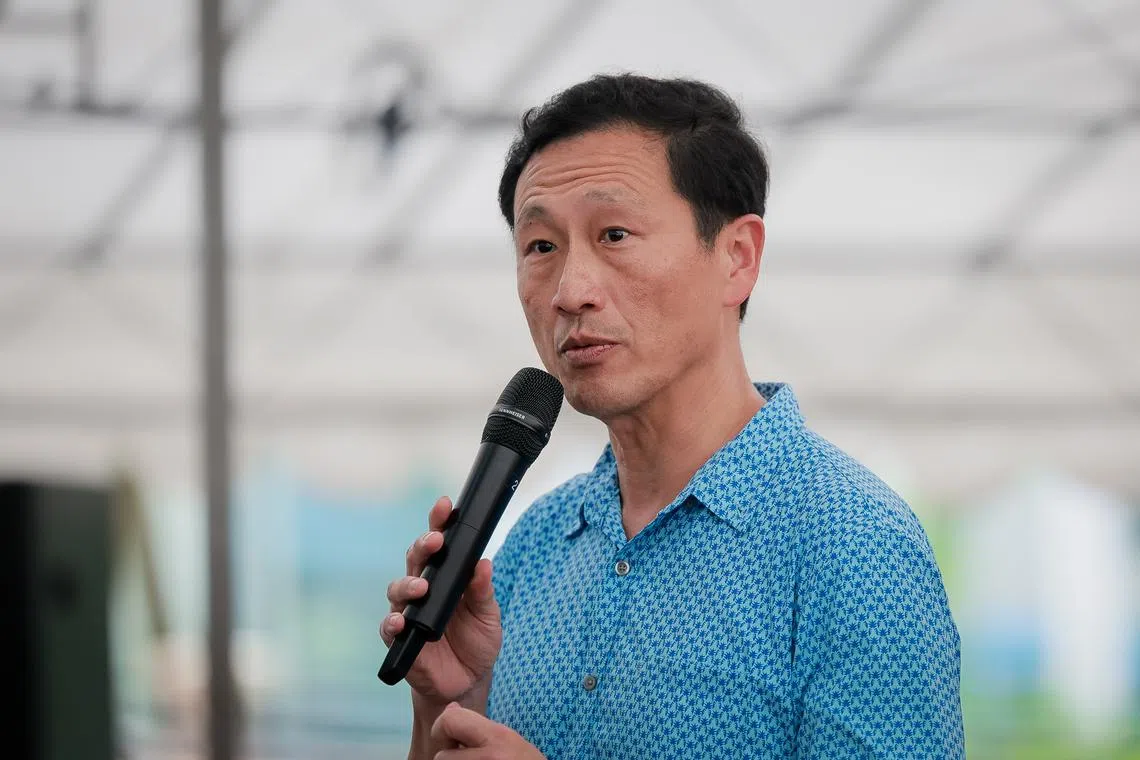Mandatory rehabilitation for vape and Kpod users is a chance for young to kick habit: Ong Ye Kung
Sign up now: Get ST's newsletters delivered to your inbox

Health Minister Ong Ye Kung said the programme will consist of weekly individual counselling, group support sessions and medical tests.
ST PHOTO: GAVIN FOO
Follow topic:
SINGAPORE – Mandatory rehabilitation for vape and etomidate abusers slated to kick in from Sept 1 is a chance for young people to kick the habit, and avoid arrest and a drug record.
Speaking on Aug 30 on the sidelines of a grassroots event in Woodlands Crescent Park, Health Minister Ong Ye Kung said the programme will last between three and six months, depending on the severity of each case.
It will consist of weekly individual counselling, group support sessions and medical tests.
“In the case of Kpods, etomidate and vapes, we are giving young people a chance. It’s still a required rehabilitation programme that you must attend.
“If you don’t attend, we will have to charge you,” said Mr Ong, adding that other drug users are arrested and end up with a criminal record.
The rehabilitation programme will be conducted at the Institute of Mental Health’s National Addictions Management Service.
“(The staff) are experienced at doing this, so we will require (vape and Kpod users) to go through the programme. And I hope they take it up,” he said.
The Government had on Aug 28 announced a slew of new measures during a multi-ministry press conference
More than 80 per cent of etomidate abusers and over half of those caught vaping are under the age of 30, said Mr Ong, who is also Coordinating Minister for Social Policies, during the press conference.
From Sept 1, those under 18 caught consuming and possessing Kpods will be fined $500, up from $300 previously. Adult offenders will be fined $700, up from $500.
Offenders will also have to attend a rehabilitation programme for up to six months.
Repeat offenders can be arrested and made to undergo mandatory supervision for six months, which includes drug testing and rehabilitation.
Mr Ong said it has always been the Government’s worry that vapes will become the gateway device for more serious substances, which is a major contributing factor for why it was banned from the start.
“In other countries, cannabis gets introduced through vapes, (and it’s) very common,” he said, adding that Singapore avoided this because of the ban on vapes, and the strict laws against the flow and use of cannabis.
Mr Ong said when cases of etomidate abuse were first reported in 2024, the Government had to observe its impact on society.
He acknowledged that the handling of cases during this period was “not ideal” due to the lack of a “fit for purpose” law.
“But we were observing. When we saw cases were not going away, and it appeared to be something that may be gaining momentum, we acted immediately,” said Mr Ong.
“It took us a couple of months to stitch together all the processes and protocols, set up the required facilities to introduce the rehabilitation programme... But I think we did it as fast as we can.”
He said the situation would have been much worse if the Government had not banned vapes from the start and conducted enforcement against vaping.
“Once you allow vaping from the outset, it’s not easy to turn back,” said Mr Ong, in response to a question from the media about whether Singapore is taking pointers from other countries on how to deal with the scourge.
“I’m in touch with most of the health ministers. Today, the problem for many of them is that they are facing a rising problem of vaping and etomidate use. I think they wish they had banned it from the outset, like us.”
Mr Ong said the newly tightened local laws have been reported by international media outlets, and other countries will be looking at Singapore’s system to find a model that works.
“I had a long discussion with the Australian health minister – they allowed vapes, but now that they see the impact, they are trying to rein it in. So what they have done is to make vapes only available through pharmacies, essentially just to use it for cessation,” said Mr Ong.
He added that Hong Kong has banned the import and sale of vapes, although possession and use are still legal. New laws introduced also disallow vaping in public spaces, although it is allowed in private spaces.
“Just like Australia, (they) find that having not banned it from the outset, it is very difficult to ban it (now). They can only rein it in, while still making vapes available.”
Mr Ong said that it is not practical to ban smoking, in response to a common query about why vaping is banned while smoking is not.
He added: “It is important for us to think of it this way – there are harmful products out there, some are already entrenched in our culture and our society. It’s difficult to turn around.
“We just have to encourage people to stop those bad habits.”
Mr Ong also said that a vape pod can contain the same amount of nicotine as four packs of cigarettes, in response to the commonly held perception that vapes are the less harmful of the two.
The prevalence of smoking in Singapore has dropped to a historical low, said Mr Ong, who cited a survey that showed the prevalence is 8.8 per cent among adults aged 15 and above as at 2023.
This is mostly made up of older adults, who have already picked up smoking as a habit.
“Amongst the young, the prevalence of smoking has been low,” said Mr Ong.
“I’m very sure without vaping, young people wouldn’t be smoking. It’s just not cool for them, and it smells.”



